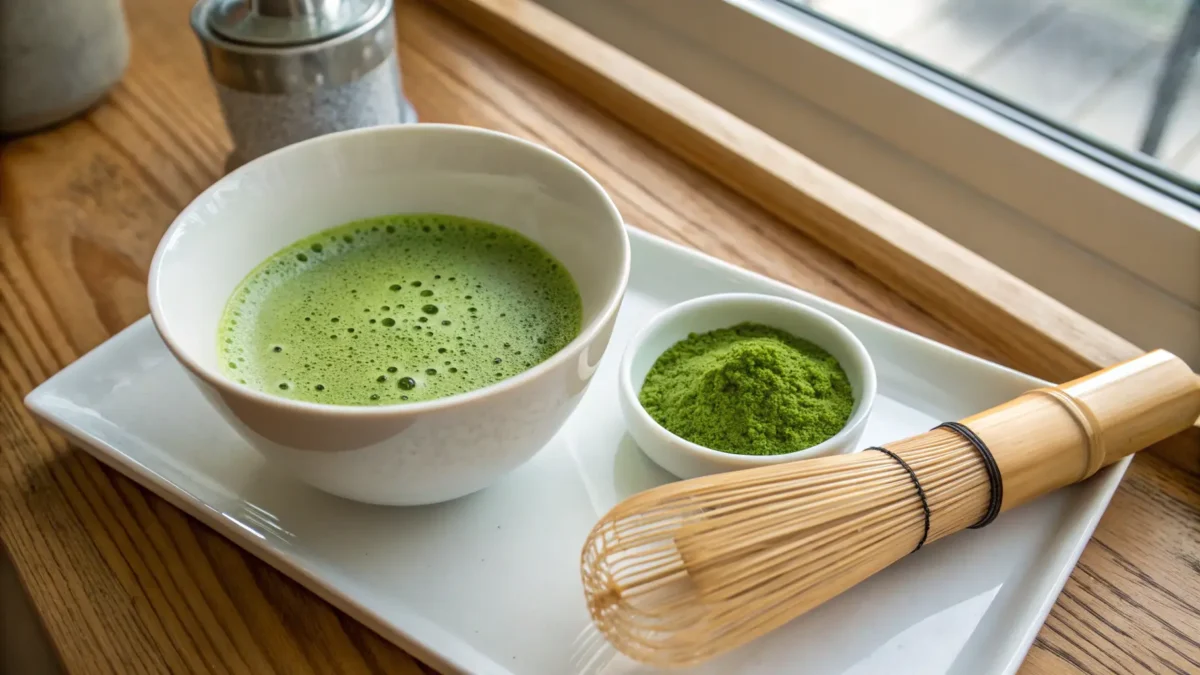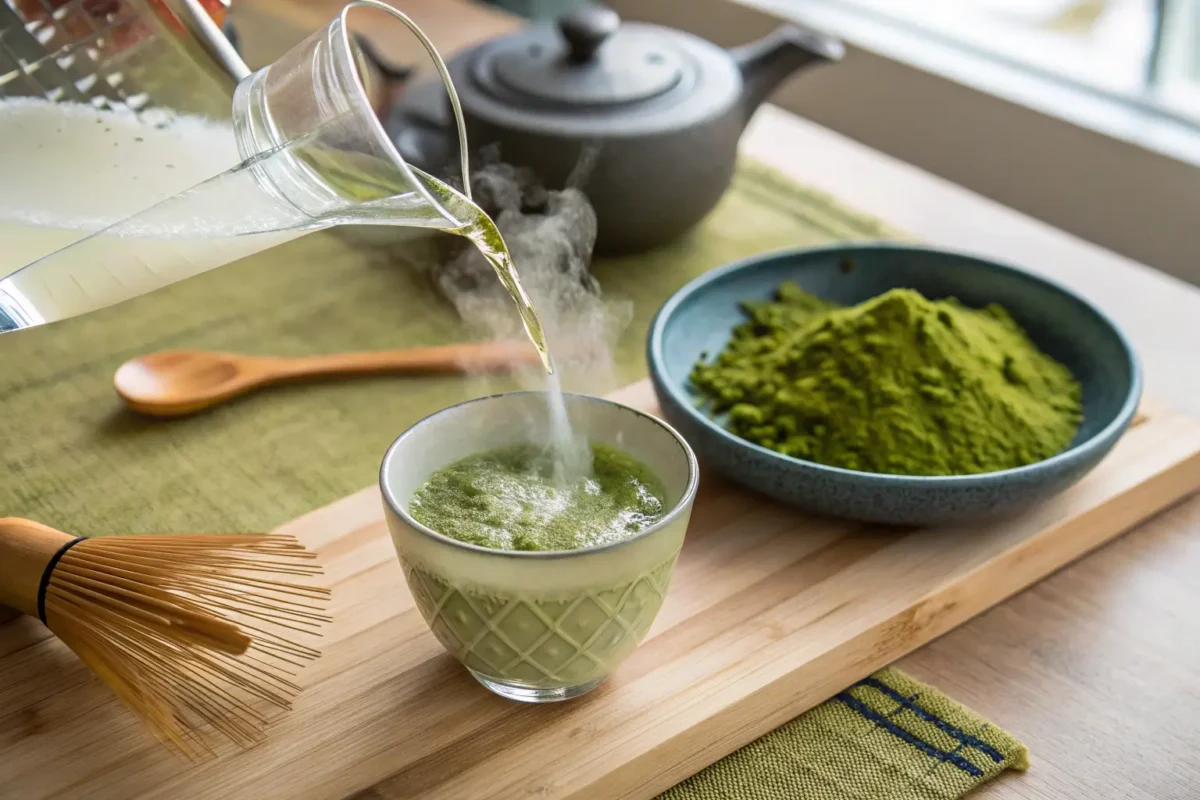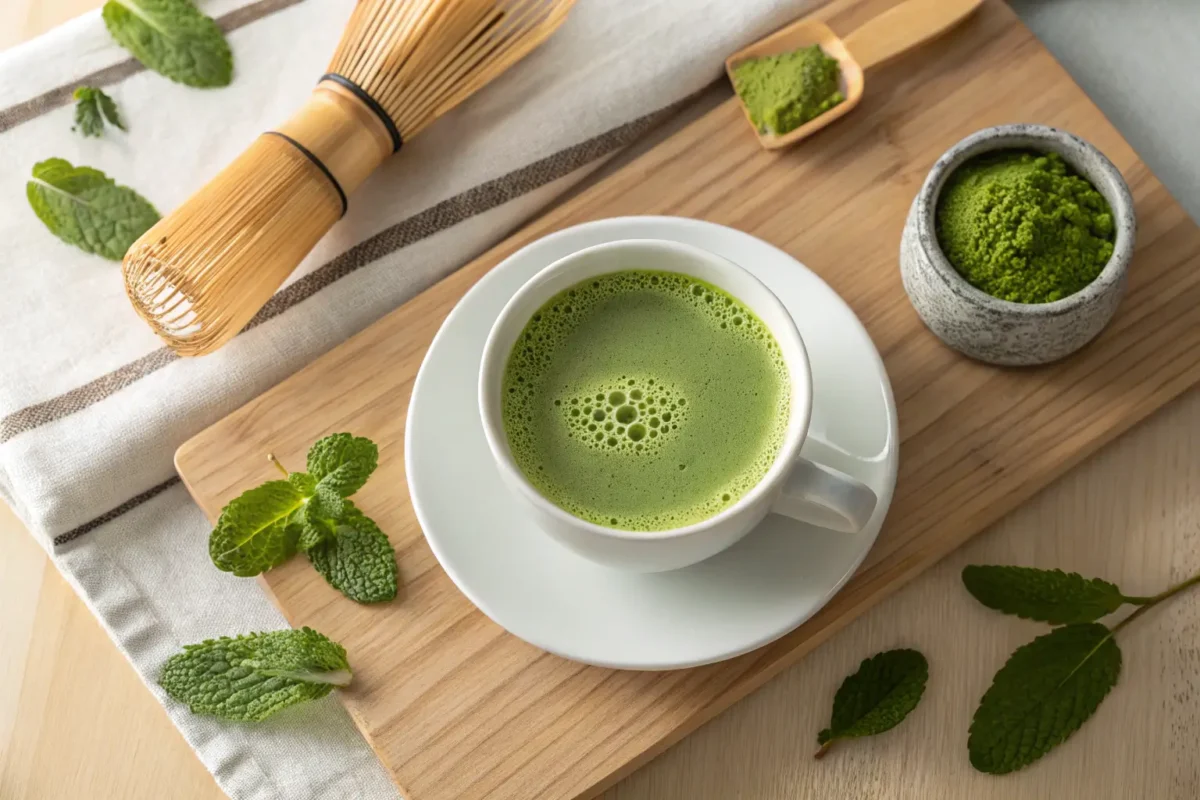Does hot water destroy matcha? Welcome to this comprehensive guide on matcha preparation! In this article, we’ll explore whether hot water truly destroys the delicate flavors and health benefits of matcha. We’ll dive into the science behind it, discuss ideal brewing temperatures, and provide tips to ensure you’re getting the most out of your favorite green tea. So, let’s get started!
Understanding the Basics of Matcha

What Is Matcha and Why Is It Special?
Origins and Cultural Significance of Matcha
Matcha has been a cornerstone of Japanese tea ceremonies since the 12th century. Its rich history dates back to when Zen Buddhist monks brought the powdered green tea from China. Today, matcha remains an integral part of Japanese rituals, symbolizing peace and tranquility.
Nutritional Benefits of Matcha
Beyond its cultural importance, matcha packs a powerful punch of nutrients. Packed with antioxidants like catechins, matcha helps boost metabolism, promote heart health, and even reduce stress. But can these benefits survive a steep dip in hot water? Let’s find out.
Explore our full collection of culinary inspiration on the Vitaly Recipes Blog.
Does Hot Water Really Destroy Matcha?
Does Hot Water Ruin the Taste of Matcha?
Let’s address the big question: Does hot water destroy matcha ? Many folks believe that exposing matcha to high temperatures can scorch or degrade its delicate flavor. However, the reality is a bit more nuanced. Understanding how different temperatures affect matcha can help you brew the perfect cup every time.
Effects of High Temperatures on Matcha Flavor: Does Hot Water Destroy Matcha?
When preparing matcha, the key is finding the sweet spot between too hot and too cold. While some might argue that boiling water ruins the taste, research shows that the right temperature can actually enhance the flavor. Studies suggest that hot water helps release amino acids , particularly L-theanine , which contribute to matcha’s smooth and umami-rich taste. This means that, contrary to popular belief, hot water doesn’t necessarily destroy matcha it can actually bring out its best qualities.
Can Boiling Water Scorch Matcha: Does Hot Water Destroy Matcha?
Contrary to common misconceptions, matcha isn’t easily scorched by hot water. The risk of scorching is much lower than many people think. However, it’s important to note that using water that’s too hot can still alter the texture and mouthfeel of the drink. To avoid this, aim for a water temperature around 175°F (80°C) rather than boiling water. This ensures that the matcha retains its vibrant color and smooth consistency, making for a truly delightful cup.
Upgrade your dessert game with this innovative Matcha Tiramisu Recipe that blends Japanese and Italian flavors.
Ideal Water Temperature for Brewing Matcha

Finding the Perfect Water Temperature for Matcha: Does Hot Water Destroy Matcha?
The ideal water temperature for brewing matcha is crucial for maximizing both flavor and health benefits. Getting the temperature just right can make all the difference in how your matcha tastes and feels. Let’s explore the recommended temperature ranges and why they matter.
Recommended Temperature Ranges for Optimal Flavor
The general consensus among tea experts is that matcha should be brewed with water that’s slightly below boiling. Specifically, water at around 175°F (80°C) is considered ideal. At this temperature, the water is hot enough to extract the full spectrum of flavors but not so hot that it burns the delicate matcha leaves. This balance ensures that the amino acids and antioxidants remain intact, delivering a smooth, rich, and satisfying cup of matcha.
Tips for Measuring Water Temperature Accurately
To achieve the perfect temperature, it’s essential to have the right tools. A kitchen thermometer is a great investment for matcha enthusiasts. Simply heat your water until it reaches the desired temperature, then pour it over the matcha powder. Alternatively, if you don’t have a thermometer, you can let the water sit off the heat for a minute or two after boiling. This allows the water to cool down to the ideal brewing temperature, ensuring that your matcha isn’t over-exposed to heat.
Discover the perfect brewing techniques in our guide to Matcha and Water Temperature, ensuring the best flavor for your matcha.
Comparing Hot Brewed vs. Cold Brewed Matcha
Hot Brewed vs. Cold Brewed Matcha: Which One Is Better?
Choosing between hot and cold brewed matcha can feel like a toss-up. Both methods have their pros and cons, and understanding the differences can help you decide which one suits your preferences best. Let’s break down the key factors, including flavor, health benefits, and preparation techniques.
Health Benefits of Hot Brewed Matcha
Hot brewed matcha is often praised for its robust flavor and full-bodied texture. But does hot water really destroy matcha ? Not necessarily. In fact, studies show that hot water can help extract more of matcha’s bioactive compounds, including antioxidants and amino acids. This means that hot-brewed matcha can offer enhanced health benefits, particularly when it comes to boosting metabolism and reducing inflammation.
Flavor Profiles of Cold Brewed Matcha
On the other hand, cold-brewed matcha offers a smoother, less bitter flavor, making it a great option for those who prefer a milder taste. Cold brewing extracts fewer bitter compounds, resulting in a sweeter, more refreshing drink. Additionally, cold-brewed matcha tends to have a lighter color and a more delicate aroma, which some people find appealing. However, it’s worth noting that cold brewing may not fully unlock all of matcha’s potential health benefits, as heat plays a role in extracting certain compounds.
Common Mistakes When Preparing Matcha
Avoid These Common Mistakes When Preparing Matcha
Even experienced matcha lovers can fall into common pitfalls when preparing their favorite green tea. By avoiding these mistakes, you can ensure that your matcha is as delicious and healthy as possible.
Using Water That Is Too Hot
One of the most frequent mistakes is using water that’s too hot. As mentioned earlier, boiling water can indeed destroy matcha by scorching the delicate leaves and altering the flavor profile. To prevent this, always use water that has cooled slightly after boiling—ideally around 175°F (80°C). This temperature strikes the perfect balance between extracting flavor and preserving the integrity of the matcha.
Incorrectly Measuring Matcha Powder
Another common error is mis-measuring the amount of matcha powder. Too little, and your drink won’t have the rich, vibrant flavor you’re looking for; too much, and it can become overly bitter. The standard ratio is typically teaspoon of matcha powder per 8 ounces of water, but you can adjust to suit your taste. Using a proper measuring spoon or scale can help ensure accuracy.
Curious about basic confections? Learn the answer to What Is Plain Cake Called? in our baking glossary.
FAQs
Got questions about does hot water destroy matcha ? We’ve got answers! From brewing techniques to health benefits, here are some common queries and their solutions.
Can You Make Matcha with Boiling Water?
Many people wonder if boiling water is okay for matcha. While it’s true that extremely hot water can scorch the delicate leaves, using water that’s just off the boil—around 175°F (80°C)—is perfectly fine. Just be sure to let the water cool slightly before pouring it over your matcha powder.
Is Cold-Brewed Matcha as Healthy as Hot Brewed?
Cold-brewed matcha is a refreshing alternative, but it may not pack quite the same punch in terms of health benefits. Hot water helps extract more of matcha’s bioactive compounds, like antioxidants and amino acids, which are essential for its health benefits. However, cold brewing still provides a good amount of these nutrients, just not as efficiently as hot brewing.
Does the Temperature of Water Affect Matcha’s Antioxidants?
Absolutely! The temperature of the water can significantly impact the extraction of antioxidants from matcha. Higher temperatures tend to release more of these beneficial compounds, contributing to matcha’s renowned health benefits. On the flip side, very hot water can denature some of the enzymes, potentially reducing the overall antioxidant content. Striking the right balance is key.

Conclusion
Wrapping Up: The Truth About Hot Water and Matcha
In conclusion, the age-old question of does hot water destroy matcha has been addressed. While extremely hot water can scorch and degrade the flavor, the right temperature can actually enhance matcha’s rich taste and health benefits. By following the recommended brewing techniques and using slightly cooled water, you can ensure that your matcha is both delicious and nutritious. Whether you prefer hot or cold-brewed matcha, enjoy the journey of discovering the perfect cup that suits your palate best. Cheers to better brewing!
For decadent celebrations, try our crowd-pleasing Jovial Chocolate Cake Recipe.
Discover the rustic charm of naked desserts in our explainer: What Is a Bare Cake Called?
Master the basics with our breakdown of the Three Major Types of Cakes every baker should know.
Rescue your bakes! Our troubleshooting guide What Is a Dry Cake? reveals science-backed moisture tips.






